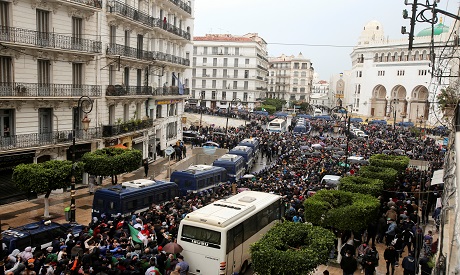
Demonstrators take part in a protest marking two years since the start of a mass protest movement demanding political change, in Algiers, Algeria February 22, 2021. REUTERS
Two years since Algeria's anti-government "Hirak" protesters first took to the streets in nationwide demonstrations on February 22, 2019, the movement remains a powerful force.
The Hirak protests swept former strongman Abdelaziz Bouteflika from power in April 2019, but continued after his fall.
Here is a timeline of the popular protests, that forced another government reshuffle Sunday.
Bouteflika quits
News that ailing 82-year-old Bouteflika would stand for a fifth term in office sparks massive protests on February 22, 2019, that continue every Friday afterwards.
The weekly demonstrations are dubbed the "Hirak", meaning the movement in Arabic.
On April 2 Bouteflika resigns after two decades in power, after powerful army chief Ahmed Gaid Salah tells him to quit.
While crowds cheer his departure, they fill the streets again on April 5 demanding the dismantling of the authoritarian system that has been in place since independence from France in 1962.
Four days later, the speaker of the upper house Abdelkader Bensalah is named interim president, but opposition parties refuse to confirm his nomination.
Army gets tough
General Gaid Salah emerges as the key powerbroker.
On May 20 he rejects the protesters' key demand that an election planned for July 4 be postponed and that regime stalwarts depart.
But two weeks later the constitutional council cancels the election due to a lack of candidates. Protests continue in the capital Algiers.
On September 18 the military toughens its line, ordering police to block demonstrators from outside Algiers entering the capital.
Regime figures jailed
A week later a military court sentences Bouteflika's brother Said and two former intelligence chiefs to 15 years in prison for "conspiring" against the state.
In December, former prime ministers Ahmed Ouyahia and Abdelmalek Sellal, who were both close to Bouteflika, are sentenced to 15 years and 12 years in jail respectively in corruption trials.
New president's weak mandate
Abdelmadjid Tebboune, a one-time prime minister under Bouteflika, wins a presidential election on December 12, with an official turnout of less than 40 percent.
The next day Tebboune calls for dialogue with protesters, who nevertheless remain on the streets.
On December 23 General Gaid Salah dies from a heart attack, aged 79.
Pandemic halts protests
Algerians flood the streets of the capital on January 31, 2020 to celebrate the 50th consecutive Friday demonstration.
However, on March 20, the streets of Algiers are empty on a Friday for the first time since the start of the protest movement due to coronavirus rules.
Protests stall amid pandemic restrictions.
Referendum
Algerians approve a revised version of the country's constitution, after record low turnout in a referendum held on November 1.
The plebiscite takes place with Tebboune hospitalised in Germany after contracting Covid-19.
He returns to Algeria but goes back to Germany for surgery following complications, returning to Algiers on February 12, 2021.
Activists freed
Thousands of Algerians rally on February 16 in the northern town of Kherrata, the cradle of the protests.
Two days later Tebboune pardons dozens of jailed Hirak activists and announces early elections.
On Friday, authorities release around 30 pro-democracy activists including journalist Khaled Drareni, of the press freedom watchdog Reporters Without Borders (RSF), who was sentenced to two years in jail in September.
Reshuffle on anniversary eve
With protests expected to mark the Hirak movement's two-year anniversary, Tebboune announces a government reshuffle that sees the departure of industry minister Ferhat-Ait Ali and a handful of other ministers.
But key figures retain their posts, including under-fire Prime Minister Abdelaziz Djerad and Justice Minister Belkacem Zeghmati, who has overseen the crackdown on protesters and opposition activists.
To mark the two-year anniversary, Algerians march on February 22 in the capital as well as other cities, but amid a heavy police presence.
Short link: